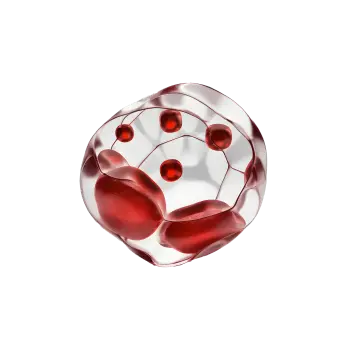How does the body's immune system work?
The immune system is a collection of cells and organs that work together to protect the body from infection and disease. Each component has a unique role in detecting, combating and preventing threats from malicious intruders.
Here is a brief description of each of these components:
- White blood cells: These are the body's specialized defense cells responsible for detecting and fighting foreign substances, including viruses, bacteria and other pathogens. They play a crucial role in eliminating threats and maintaining the health of the body.
- Other types of cells: In addition to white blood cells, the immune system also includes other cell types that can respond to infections by releasing signaling substances that attract other immune cells to the area. These cells act as an initial warning signal to mobilize an immune response.
- The Blood: The blood acts as a transport system for white blood cells and signaling substances required to coordinate immune responses. It enables the immune cells to quickly reach the areas where an infection or injury has occurred.
- Lymph and lymphatic vessels: Lymph is a fluid that circulates through the lymphatic vessels and acts as a transport route for white blood cells and other immune cells. The lymphatic vessels and lymph are important for removing excess fluid and waste products from the tissues.
- The lymph nodes: The lymph nodes are small, bean-shaped structures found along the lymphatic vessels and act as sites where immune cells interact and work together. They filter and clean the lymph of harmful substances and help to activate immune cells when necessary.
- Spleen: The spleen functions as an organ where white blood cells can fight harmful substances and remove old or defective blood cells. It has an important role in cleaning the blood from potentially dangerous particles.
- Thymus: The thymus is the organ where certain white blood cells, especially T lymphocytes, mature and develop into specialized cells that play a central role in the immune response. The thymus is particularly important during childhood and adolescence.
What defines a good or a poor immune system?
A strong immune system is characterized by the ability to quickly identify and fight harmful pathogens. It reacts adequately to threats and can form immunological memory, which means that the body is better prepared for future attacks. On the other hand, a weakened immune system can result in increased susceptibility to infections and a weaker ability to fight them.
Can I affect my immune system?
Yes, you can definitely influence your immune system through healthy lifestyle choices. A balanced diet rich in nutrients, vitamins and minerals strengthens the immune system. Regular physical activity and adequate sleep are also important to maintain a strong defense. Managing stress and avoiding harmful habits such as smoking and excessive alcohol consumption can also positively affect the immune system.
Are there factors that can affect my immune system?
Yes, several factors can affect the strength and function of the immune system. Certain medical conditions, such as autoimmune diseases where the body's immune system attacks its own cells, can weaken defense mechanisms. Blood deficiency (anemia) and other nutritional deficiencies can also affect the immune system negatively.
What can I do if I suspect that my immune system is impaired?
If you suspect that your immune system is impaired, it is important to consult a doctor. The doctor can help you perform the necessary tests and assessments to determine if there are any underlying medical causes. If you suffer from autoimmune diseases or other health problems that affect the immune system, the doctor can recommend the appropriate treatment. Otherwise, you can focus on trying to live healthily with proper nutrition, exercise and sleep to strengthen your immune system.
The body's immune system plays a crucial role in protecting us against infection and disease, by taking care of your health and making informed choices you can influence and strengthen your immune system to enjoy better overall health.























